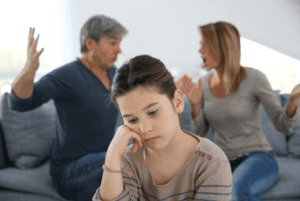Deciding to separate or divorce is not something we ever thought would happen to us. It doesn’t matter whether it was a mutual decision or not, we all still experience different emotions as we begin to work through the many changes that will take place in our lives. Such a major change has a big impact on the children. How parents handle this will determine how the children will deal or eventually accept it. There can be inter-parental conflict which can be a way of getting back at the other parent. There are adjustments to the children’s living arrangements – living between two households, who and how often the children spends time with the parents, different house-rules etc.
Parents often worry how they will tell the children. Be prepared by making some notes so that your anxiety levels are reduced. It is best to be truthful, reinforce the love you both have for them (and that that will never change), and do your best to answer any of their questions. As hurt and angry as either of you are, avoid at all costs, blaming one another to the children. Separation or divorce can also be extremely stressful for children.
Some children outwardly express their emotions whereas other children contain their emotions inwardly (we need to pay attention to what is happening under the radar of thoughts for them). As adults, we can talk to family and friends about what is going on for us; this is not always the case for children. Quite often we can be so overwhelmed with the changes going on for us that we are not noticing changes in our children.
Do children and parents share similar emotions?
Children (like adults) experience confusion, uncertainty and anxiety (to name a few), so it is beneficial for the parents to make this process (and the effects it can have on them) less traumatic. For some parents, it is normal to feel uncertain in how to provide the right amount of support for their children. Parents who experience less upset with their children will generally be reassuring, and have a more positive attitude for the future.
Separation and divorce becomes a transitional time for parents and children with many mixed emotions. Having some sort of routine that everyone can rely on will provide a sense of stability and structure in a time where everyone is heading into unchartered territory.
Some things to look out for include…
- Changes in a child’s behavior – withdrawn, acting out, crying or becoming easily frustrated
- Experiencing anxiety and increased sadness
- Sleep problems
- Reduced concentration
- Complaints from the school regarding your child’s behavior
- Self-harming
Remember…
If things do not improve after several months, this could be a signal that your child may need some extra support. It is important to make sure you discuss what is going on with your child’s teacher (considering how much time they are at school) who can then liaise with you to ensure there is transparency with their home/school lives.




